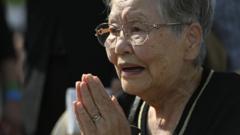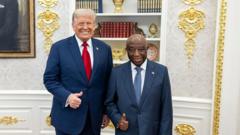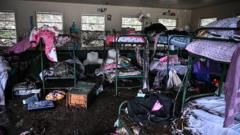On August 6, 2025, Hiroshima commemorated the 80th anniversary of the atomic bombing, reigniting discussions about nuclear weapons and their implications in modern geopolitics.
**Hiroshima Commemorates 80 Years Since Atomic Bombing Amid Global Tensions**

**Hiroshima Commemorates 80 Years Since Atomic Bombing Amid Global Tensions**
Japan honors the tragic anniversary with calls for nuclear disarmament as concerns rise over military escalation.
In a solemn ceremony on Wednesday morning, Hiroshima marked a pivotal point in history as it acknowledged the devastation wrought by the atomic bomb dropped by the United States on August 6, 1945. Japanese Prime Minister Shigeru Ishiba attended the event alongside international dignitaries and the city's mayor, Kazumi Matsui.
Mayor Matsui utilized the occasion to sound alarms regarding a "global accelerating trend toward military build-up," emphasizing the dangers of viewing nuclear weapons as essential for national defense. He lamented what he saw as a "flagrant disregard for the lessons the international community should have learned from the tragedies of history."
World War II concluded with Japan’s surrender following the bombings of Hiroshima and Nagasaki, which resulted in over 200,000 deaths due to initial blasts, radiation exposure, and subsequent illnesses. The survivor's testimony remains haunting as they continue to grapple with the lasting impacts of the bomb. Survivor Shingo Naito, who lost his father and siblings in the catastrophe, shared his traumatic experiences with students, transforming his painful memories into art to preserve the legacy of those affected.
On the horizon, the Japanese organization Nihon Hidankyo, composed of atomic bomb survivors, is emerging as an active advocate for nuclear disarmament and has been nominated for the Nobel Peace Prize for their efforts towards a nuclear-free world. Mayor Matsui's speech also highlighted the precarious state of the nuclear Non-Proliferation Treaty, calling it "on the brink of dysfunctionality."
He urged the Japanese government to ratify the Treaty on the Prohibition of Nuclear Weapons, which seeks to eliminate nuclear arsenals globally and has over 70 signatories, though major nuclear nations such as the United States and Russia oppose it, favoring the deterrent strategy of their nuclear stockpiles.
The divided landscape regarding nuclear weapons in Japan was starkly evident during the ceremonies, where small protests advocating for disarmament occurred outside the Hiroshima Peace Memorial Park. Atomic bomb survivor Satoshi Tanaka expressed how current conflicts, like those in Gaza and Ukraine, evoke painful memories of the past, underscoring the enduring danger of nuclear weapons worldwide.
Tanaka's powerful cry for action urged global citizens to raise their voices against the threat of nuclear annihilation, stating, "The most urgent priority is to push the leaders of nuclear-armed countries. The people of the world must become even more outraged, raise their voices louder, and take massive action."
Mayor Matsui utilized the occasion to sound alarms regarding a "global accelerating trend toward military build-up," emphasizing the dangers of viewing nuclear weapons as essential for national defense. He lamented what he saw as a "flagrant disregard for the lessons the international community should have learned from the tragedies of history."
World War II concluded with Japan’s surrender following the bombings of Hiroshima and Nagasaki, which resulted in over 200,000 deaths due to initial blasts, radiation exposure, and subsequent illnesses. The survivor's testimony remains haunting as they continue to grapple with the lasting impacts of the bomb. Survivor Shingo Naito, who lost his father and siblings in the catastrophe, shared his traumatic experiences with students, transforming his painful memories into art to preserve the legacy of those affected.
On the horizon, the Japanese organization Nihon Hidankyo, composed of atomic bomb survivors, is emerging as an active advocate for nuclear disarmament and has been nominated for the Nobel Peace Prize for their efforts towards a nuclear-free world. Mayor Matsui's speech also highlighted the precarious state of the nuclear Non-Proliferation Treaty, calling it "on the brink of dysfunctionality."
He urged the Japanese government to ratify the Treaty on the Prohibition of Nuclear Weapons, which seeks to eliminate nuclear arsenals globally and has over 70 signatories, though major nuclear nations such as the United States and Russia oppose it, favoring the deterrent strategy of their nuclear stockpiles.
The divided landscape regarding nuclear weapons in Japan was starkly evident during the ceremonies, where small protests advocating for disarmament occurred outside the Hiroshima Peace Memorial Park. Atomic bomb survivor Satoshi Tanaka expressed how current conflicts, like those in Gaza and Ukraine, evoke painful memories of the past, underscoring the enduring danger of nuclear weapons worldwide.
Tanaka's powerful cry for action urged global citizens to raise their voices against the threat of nuclear annihilation, stating, "The most urgent priority is to push the leaders of nuclear-armed countries. The people of the world must become even more outraged, raise their voices louder, and take massive action."






















